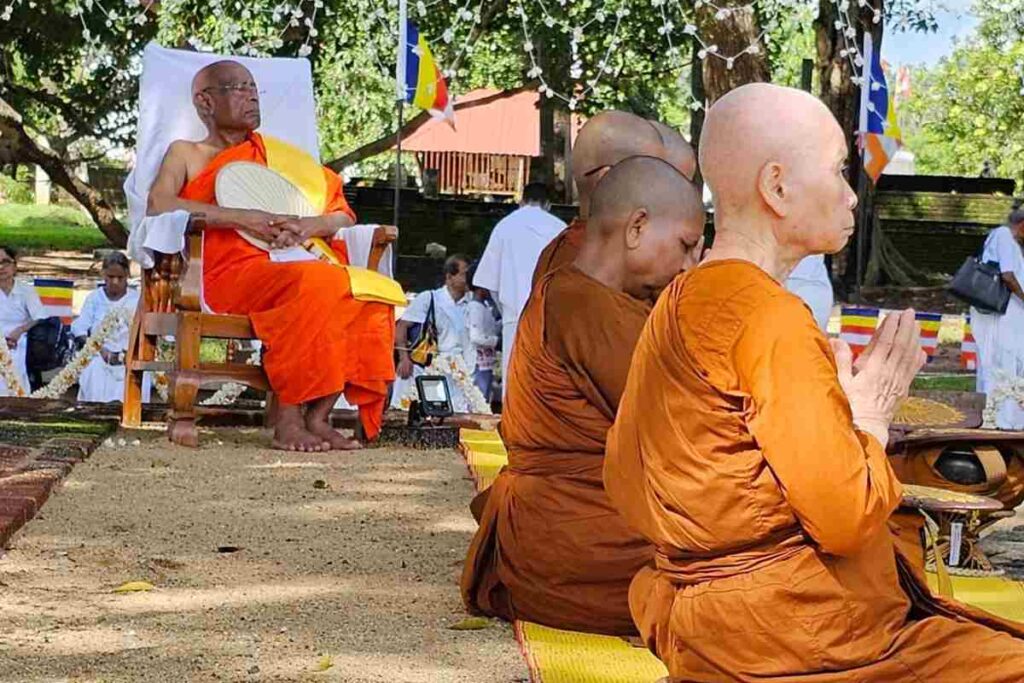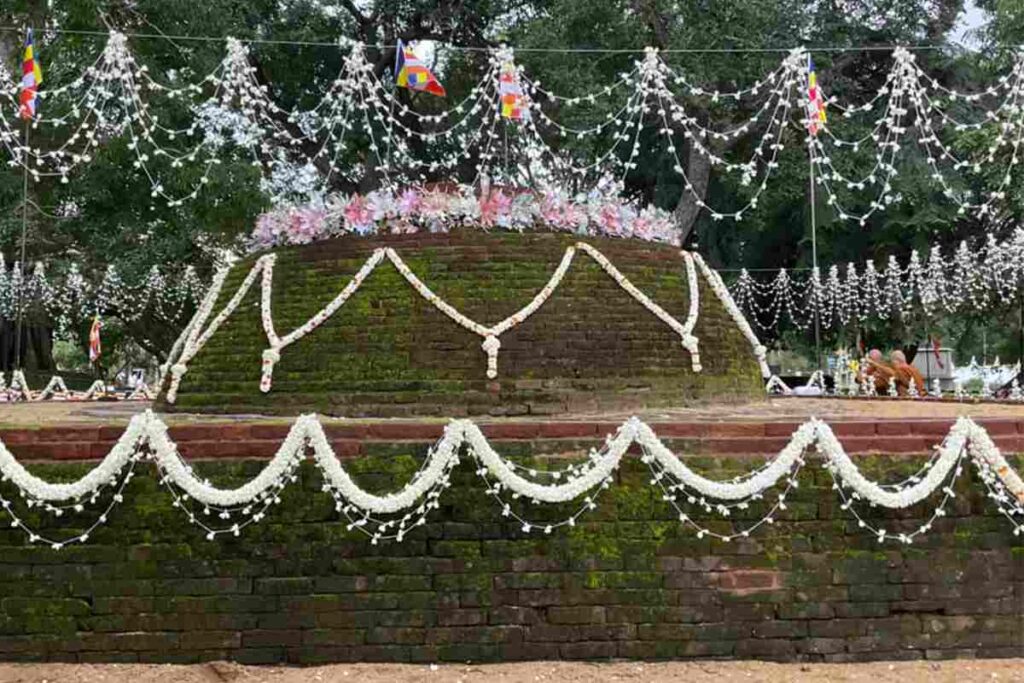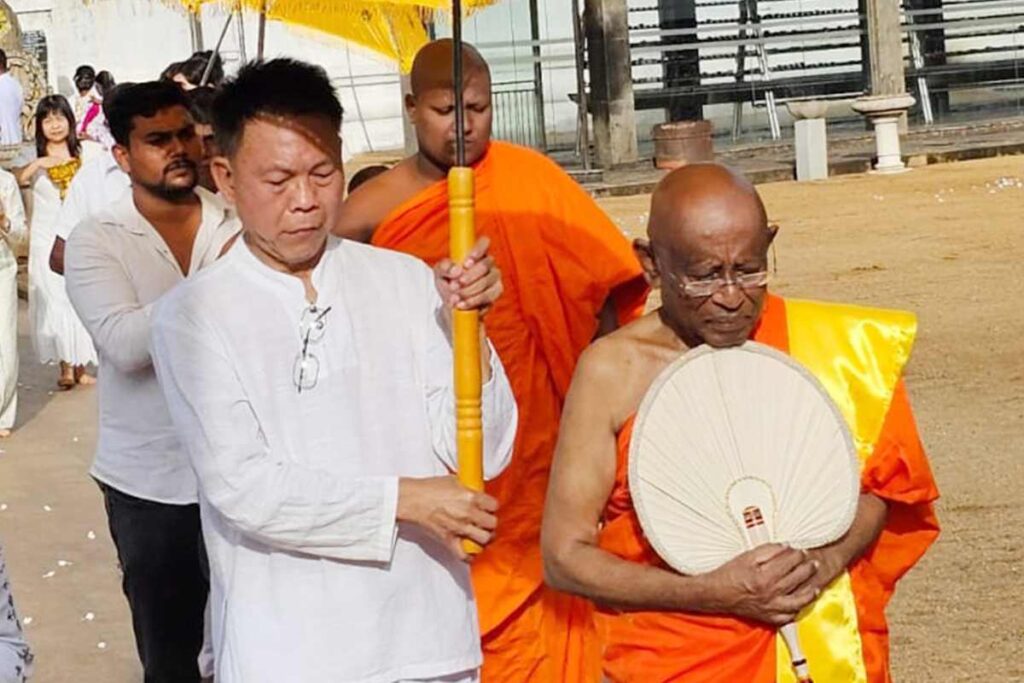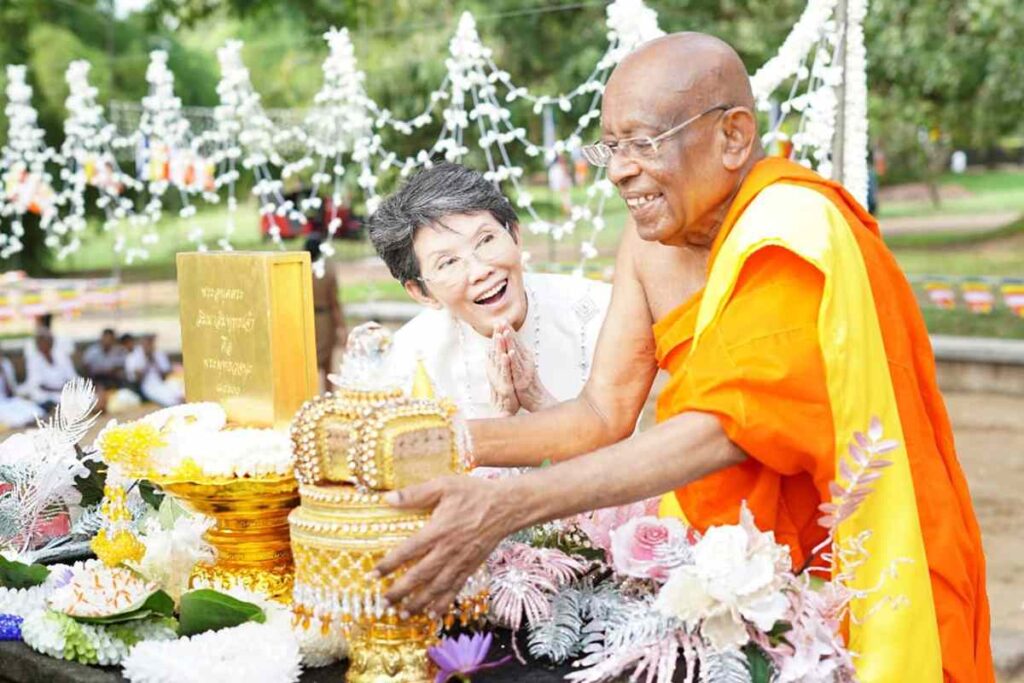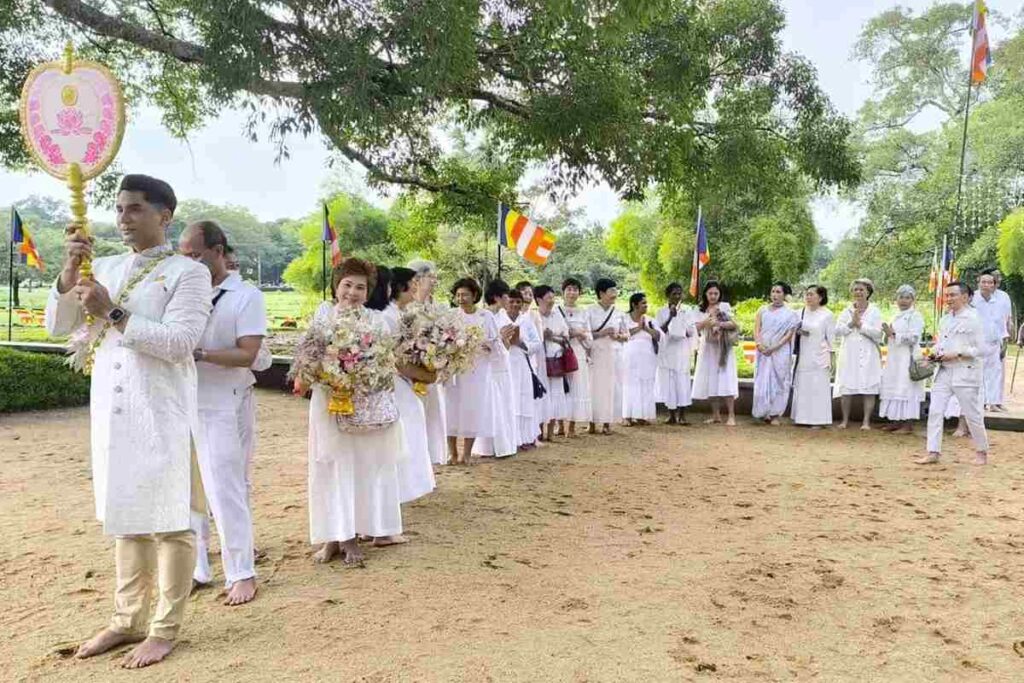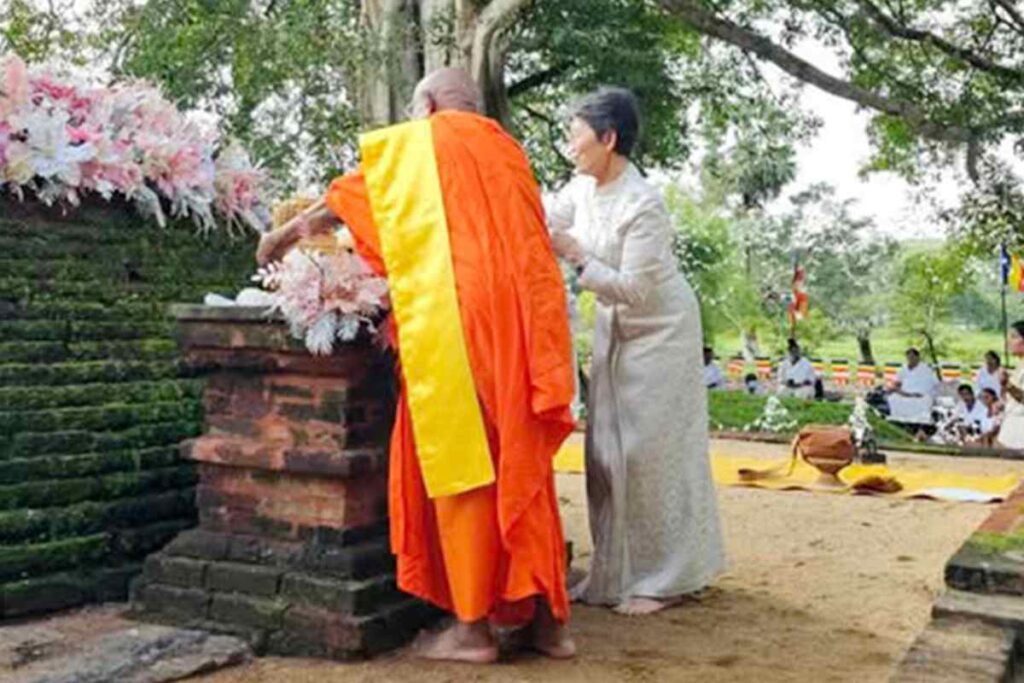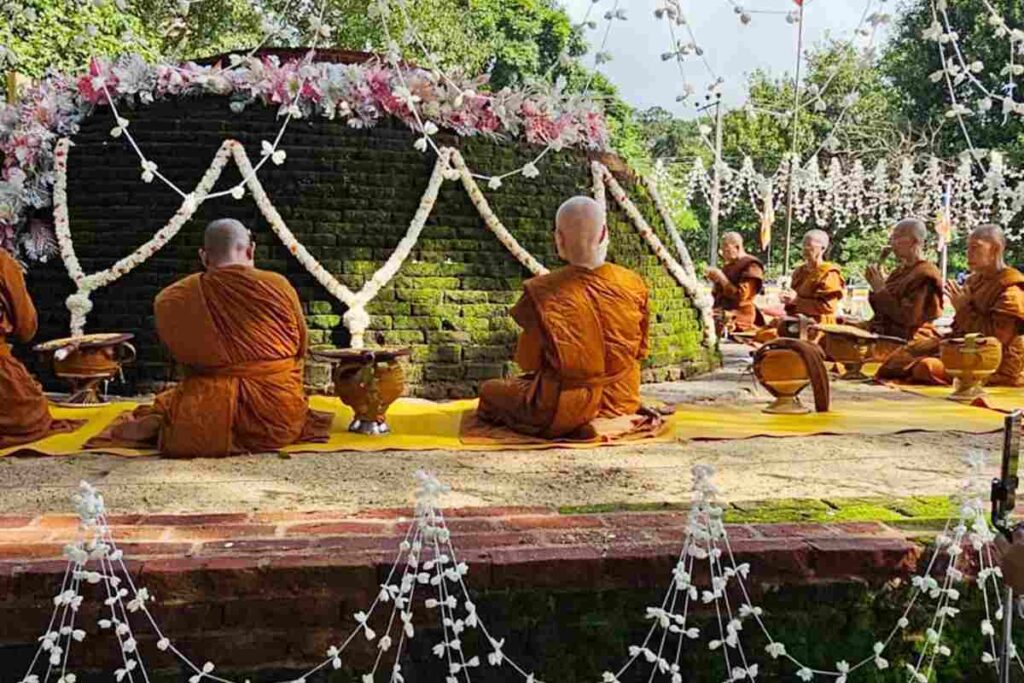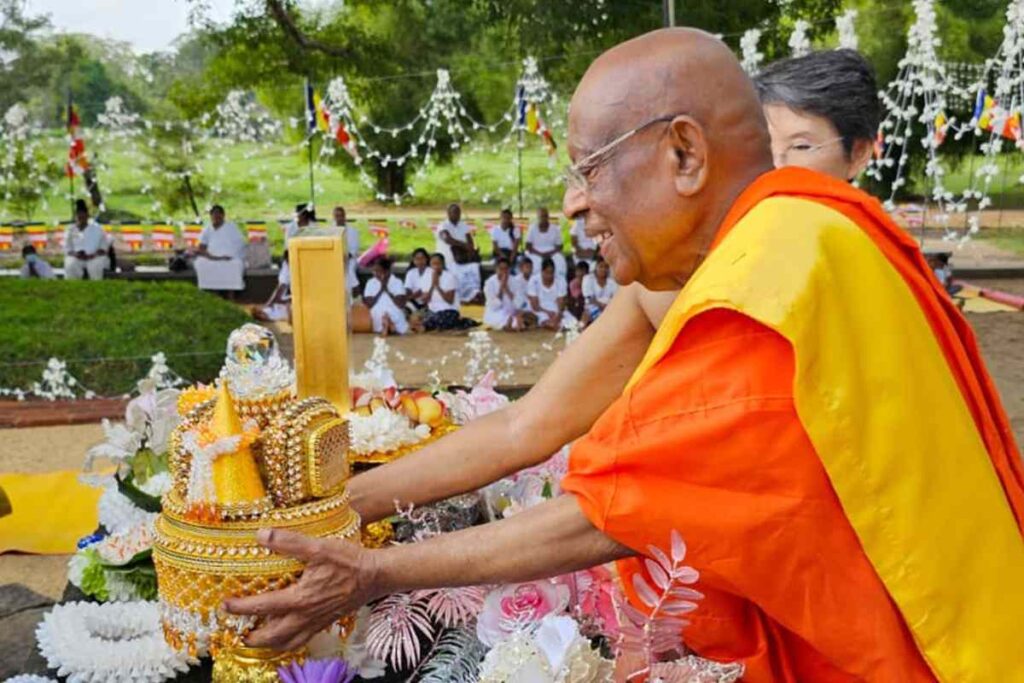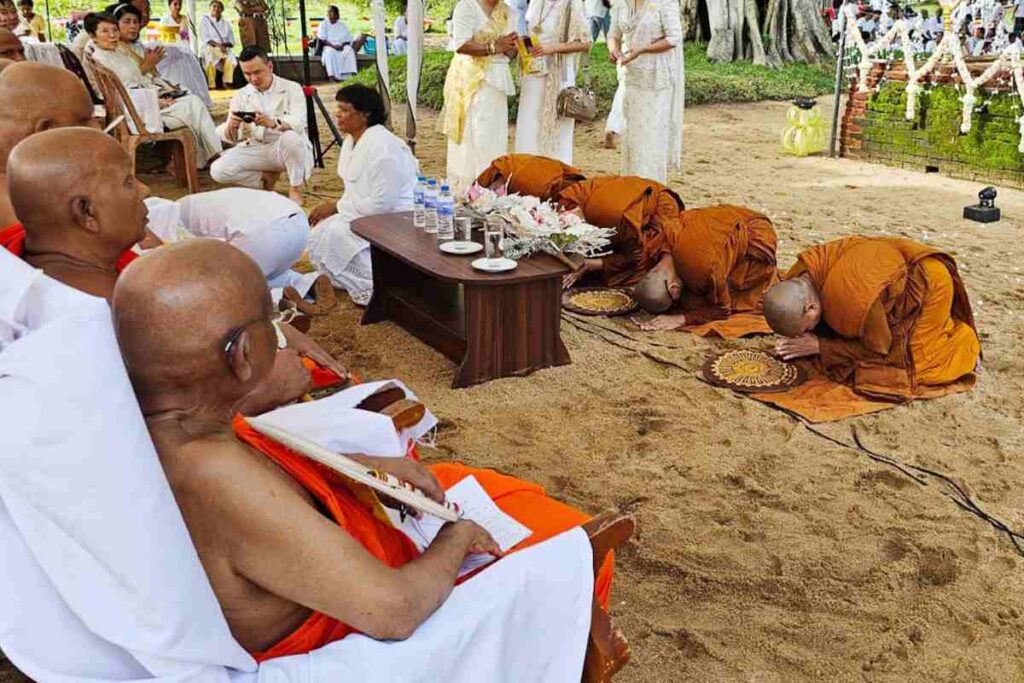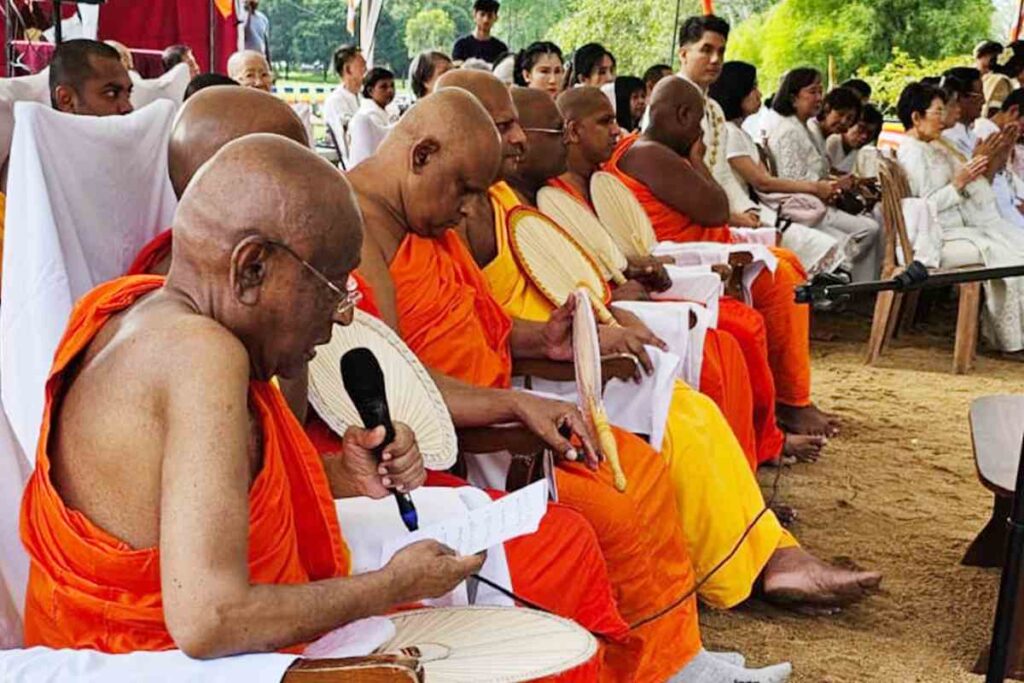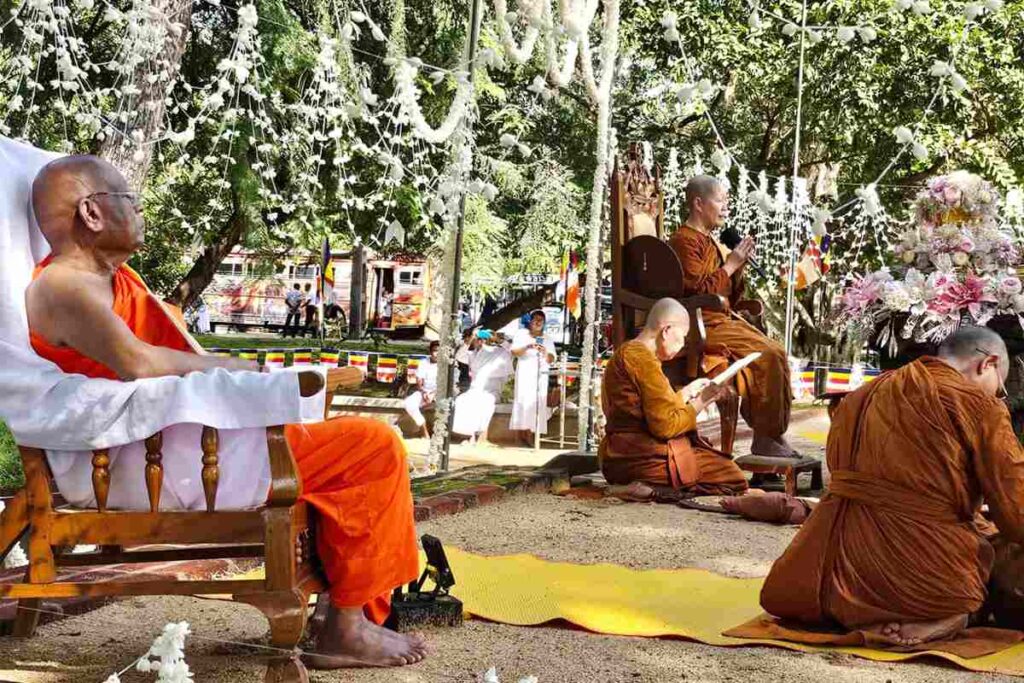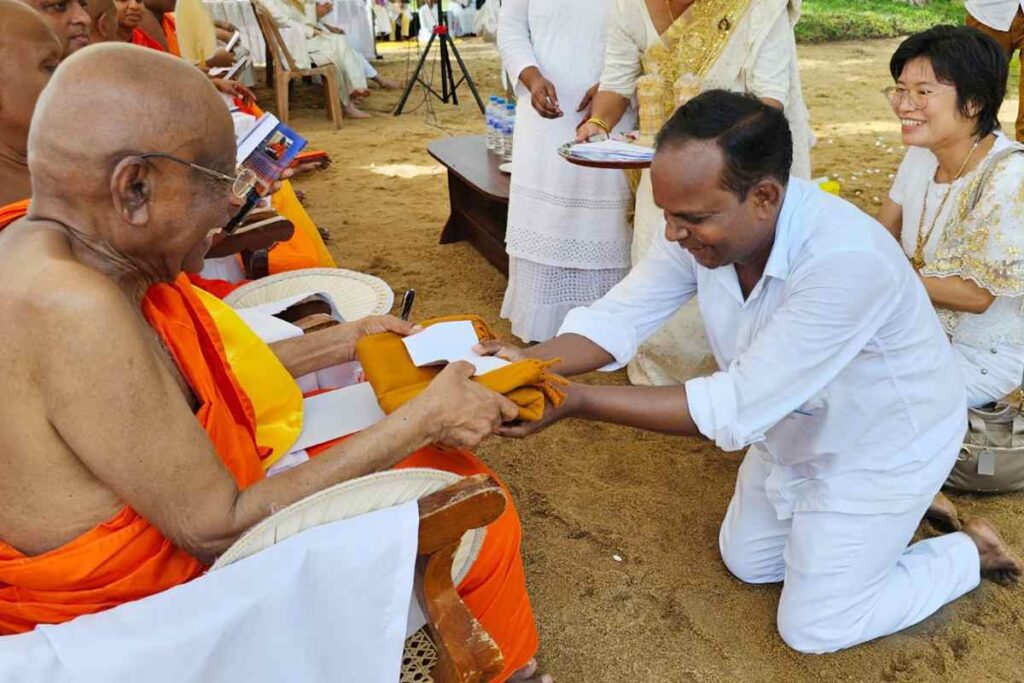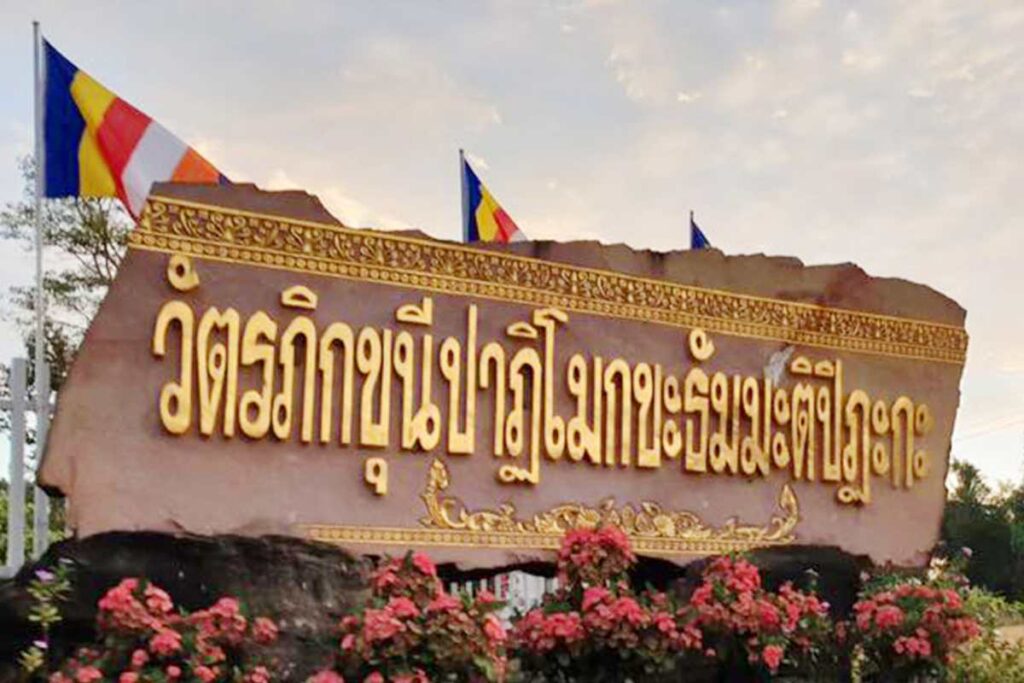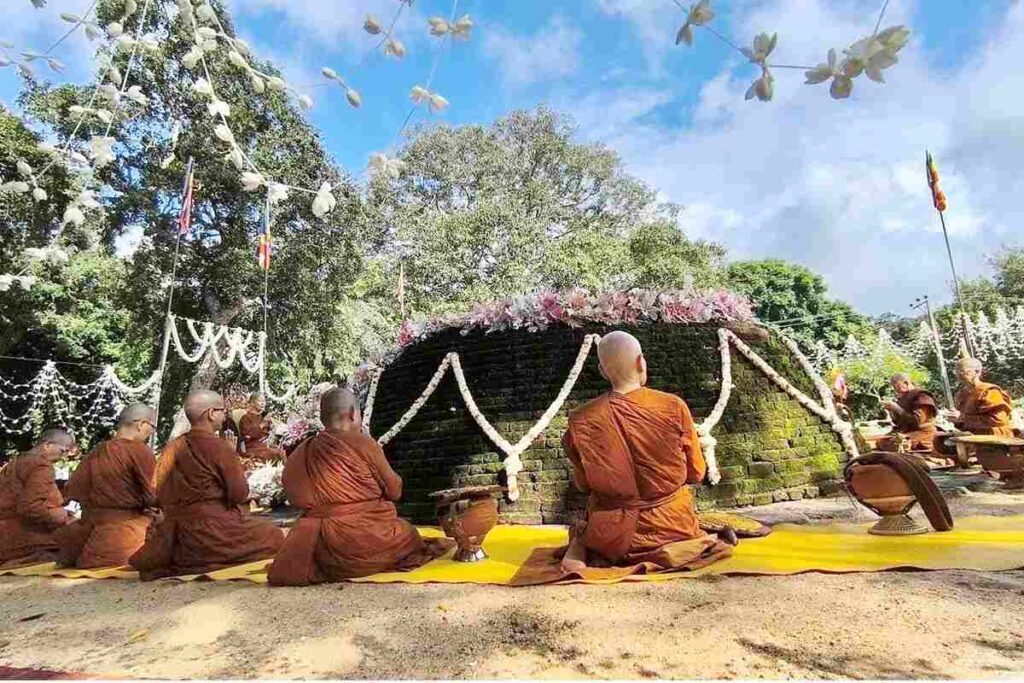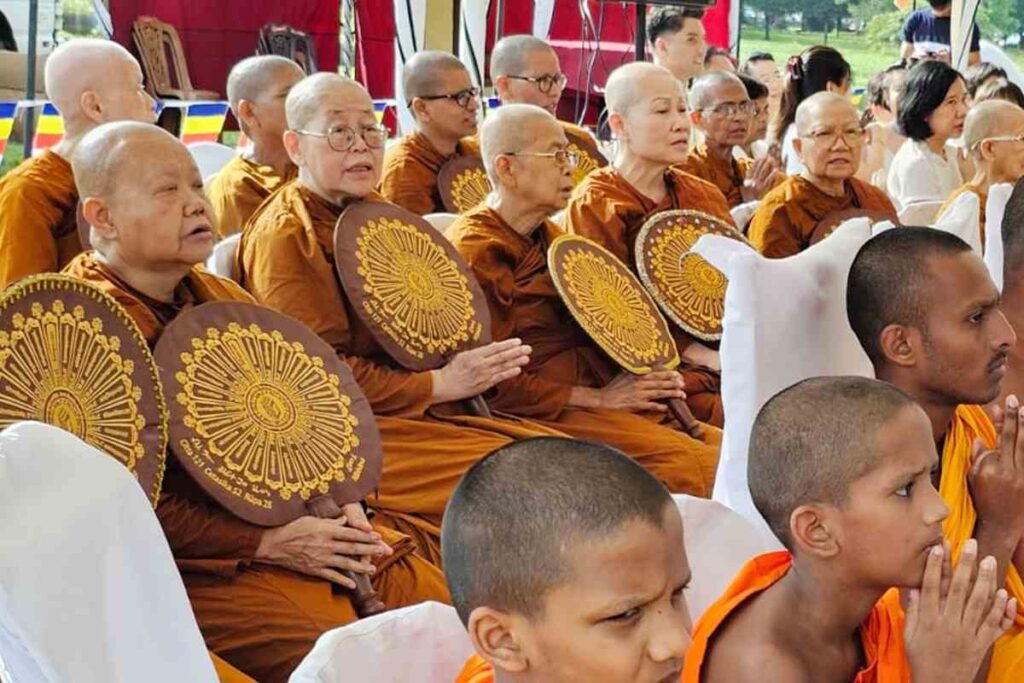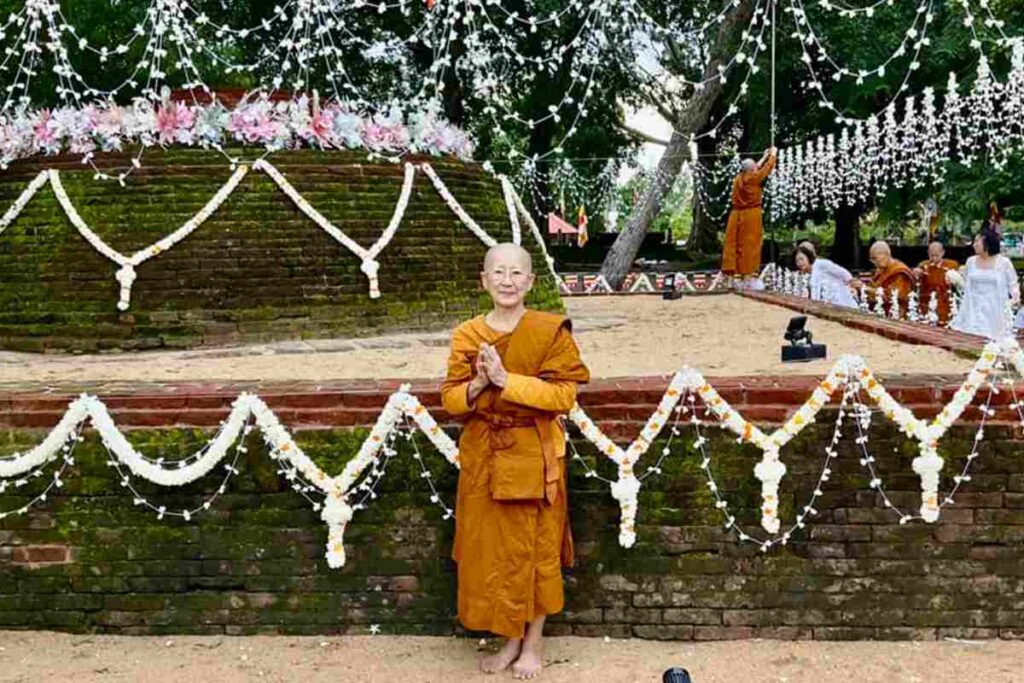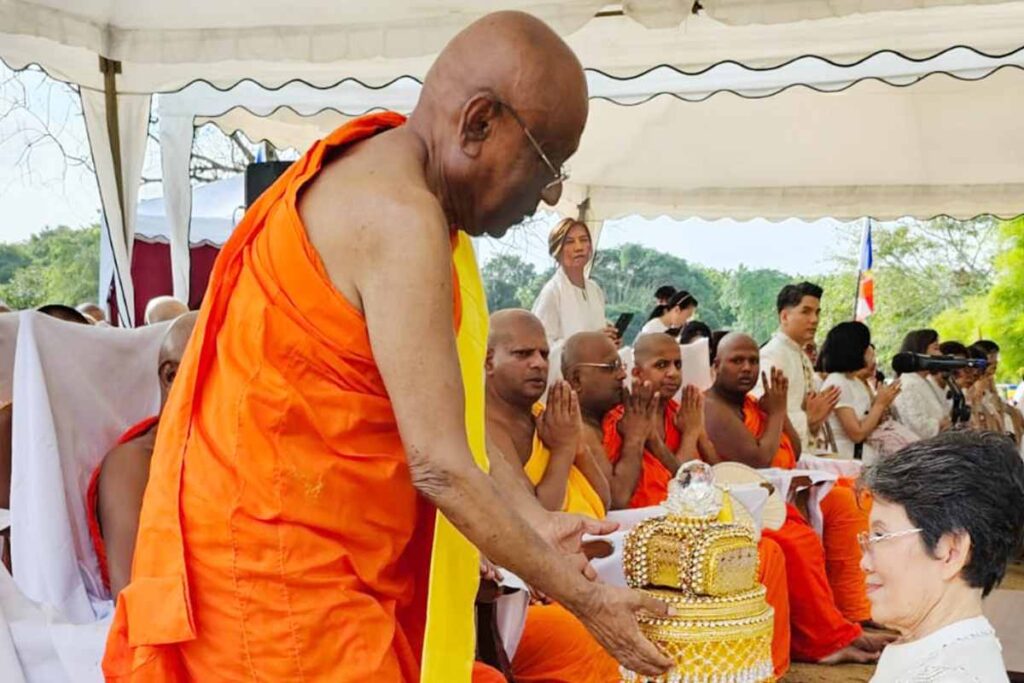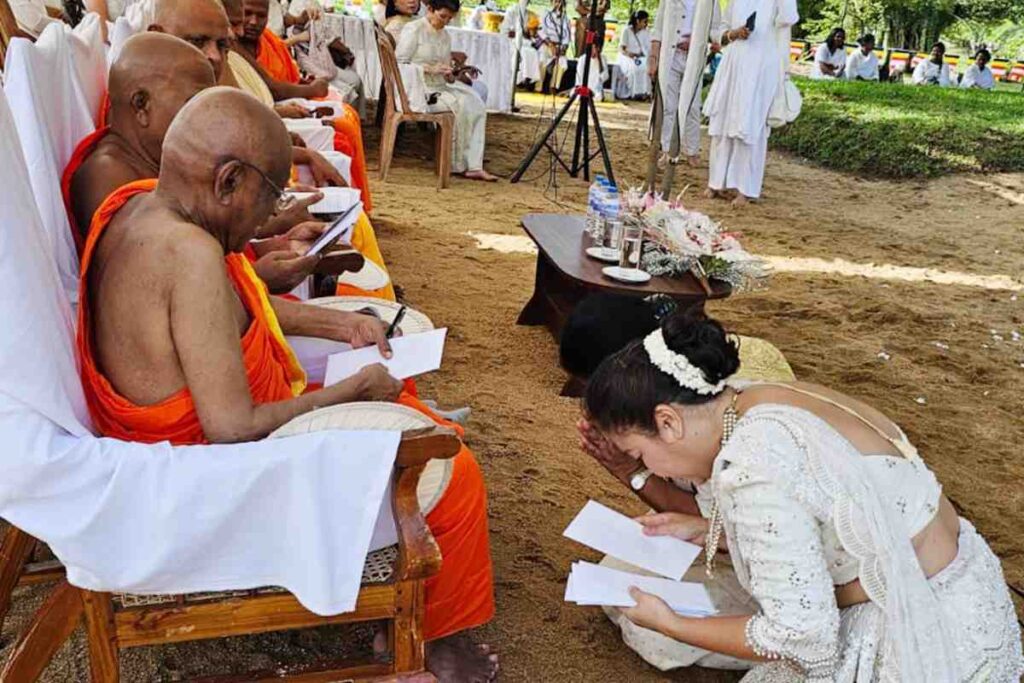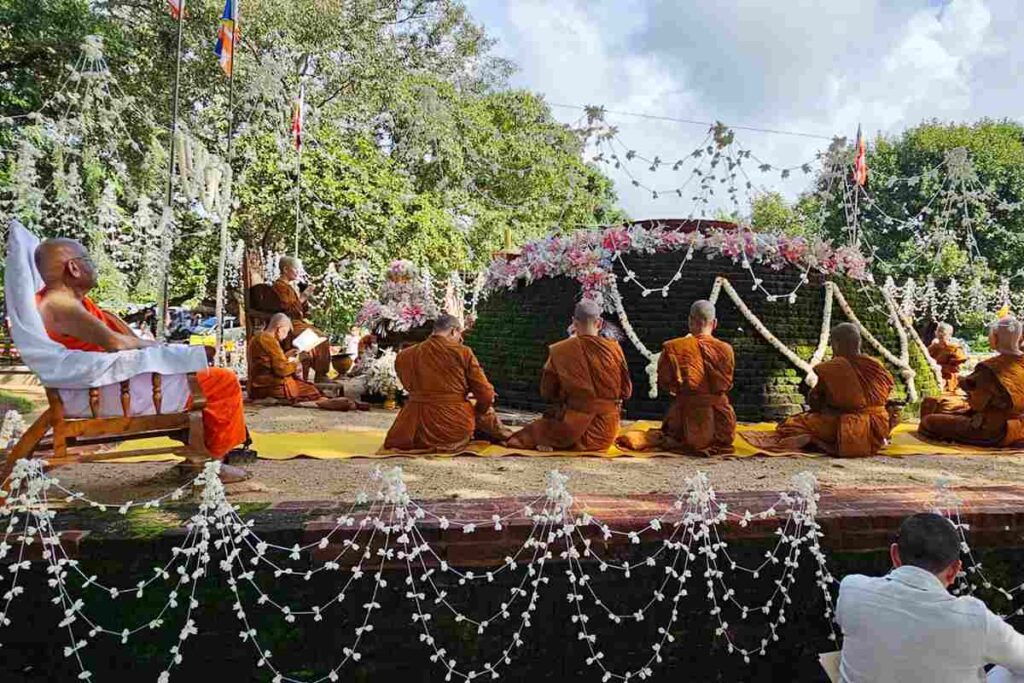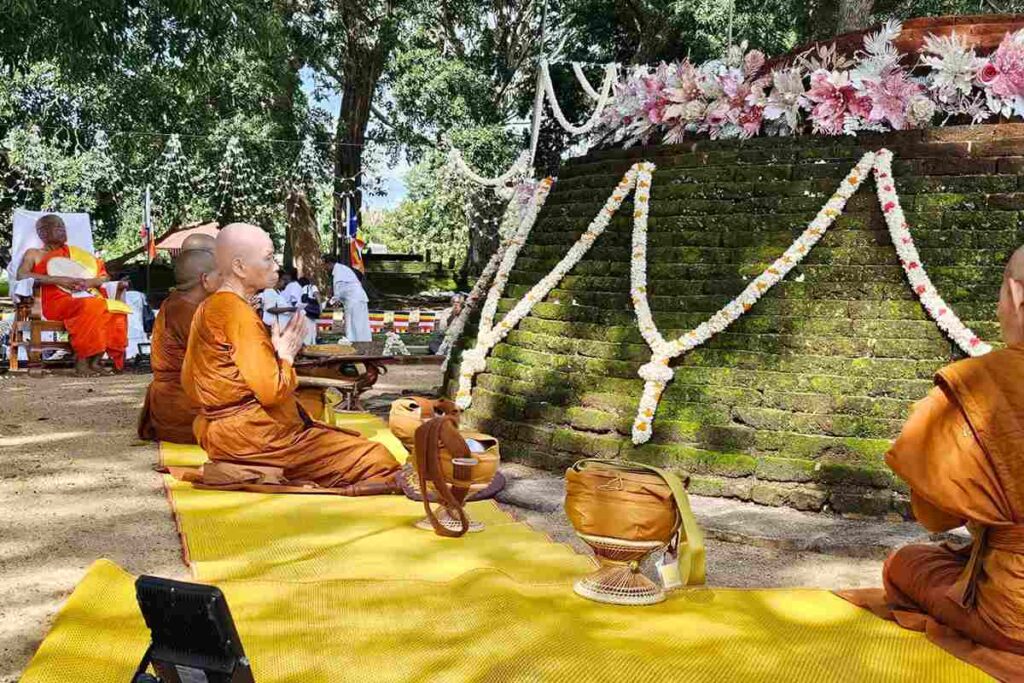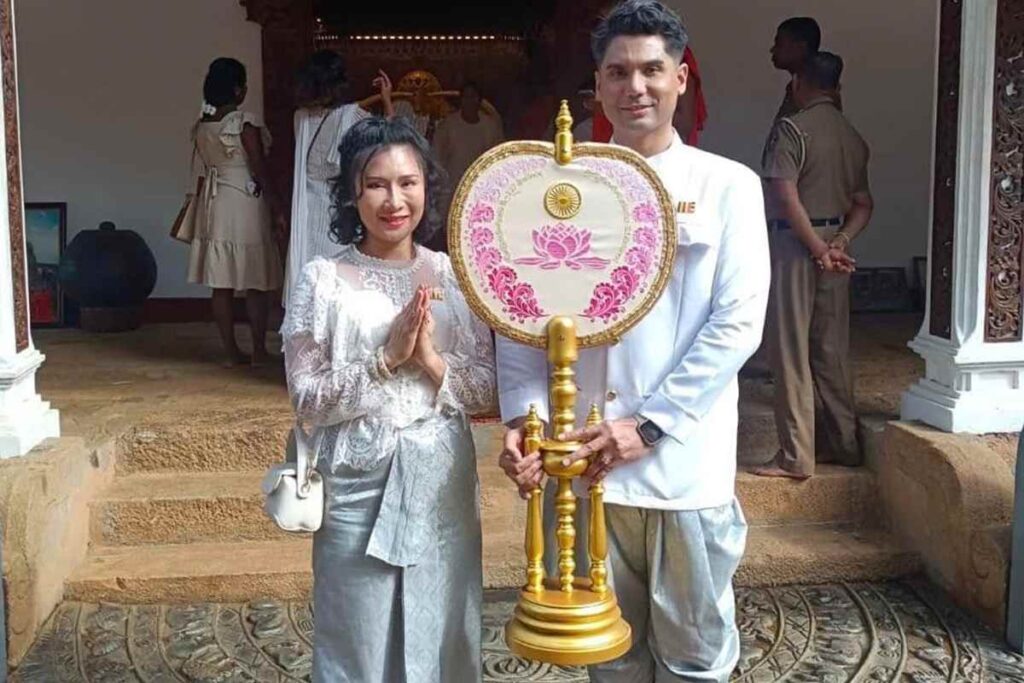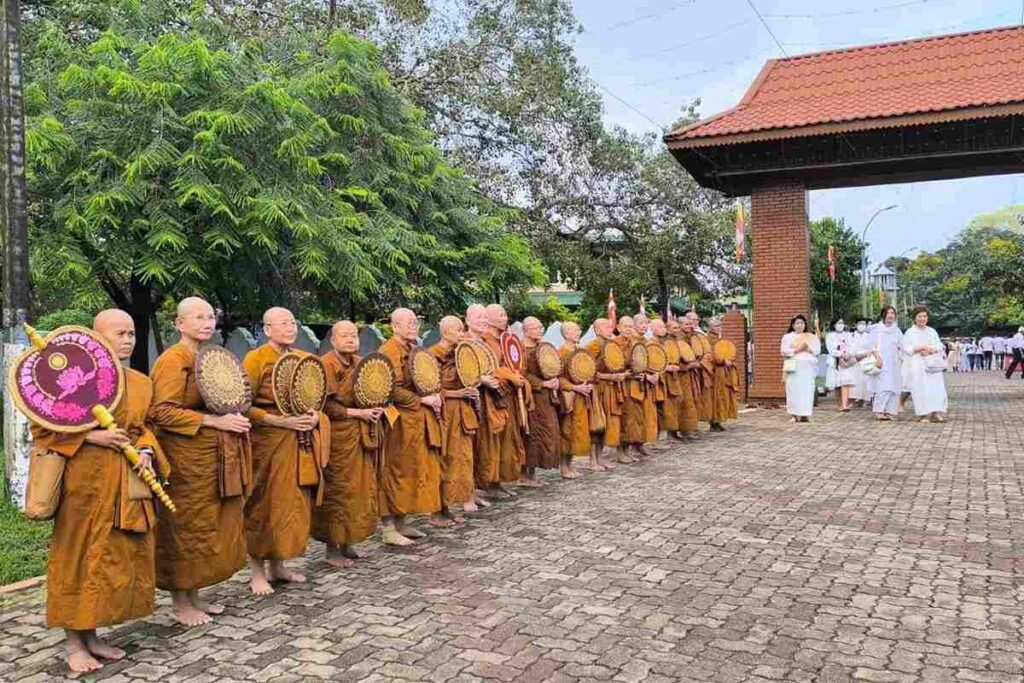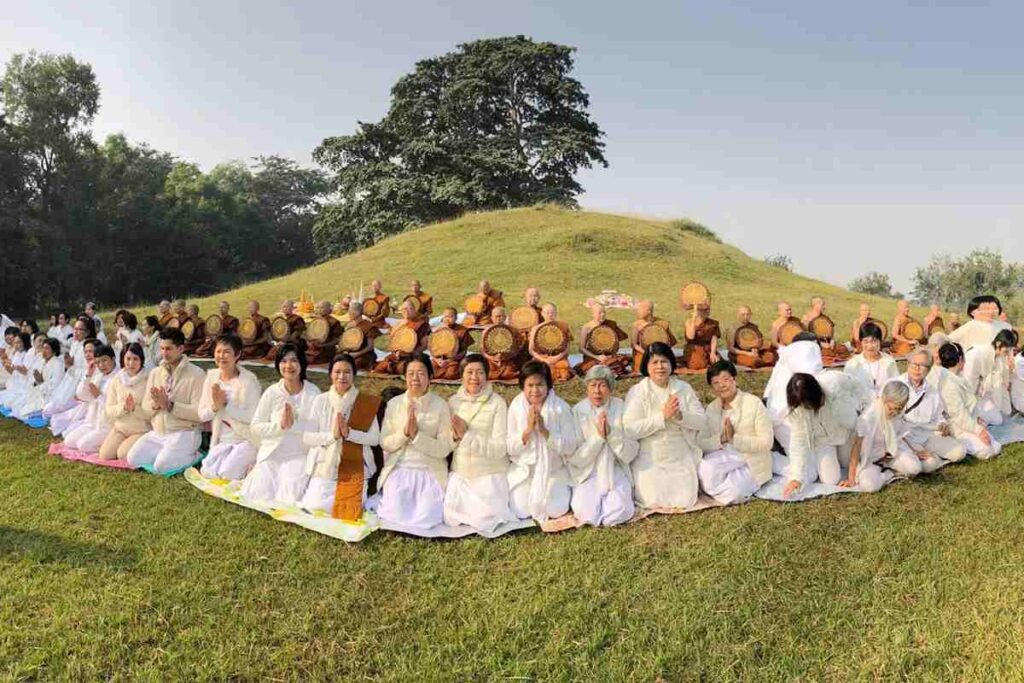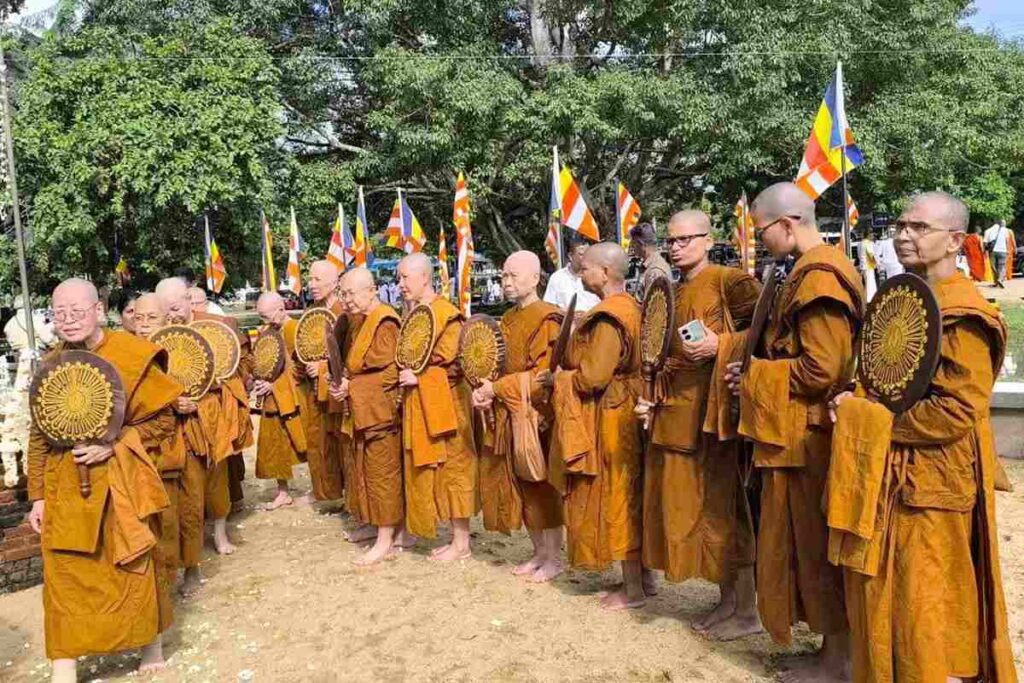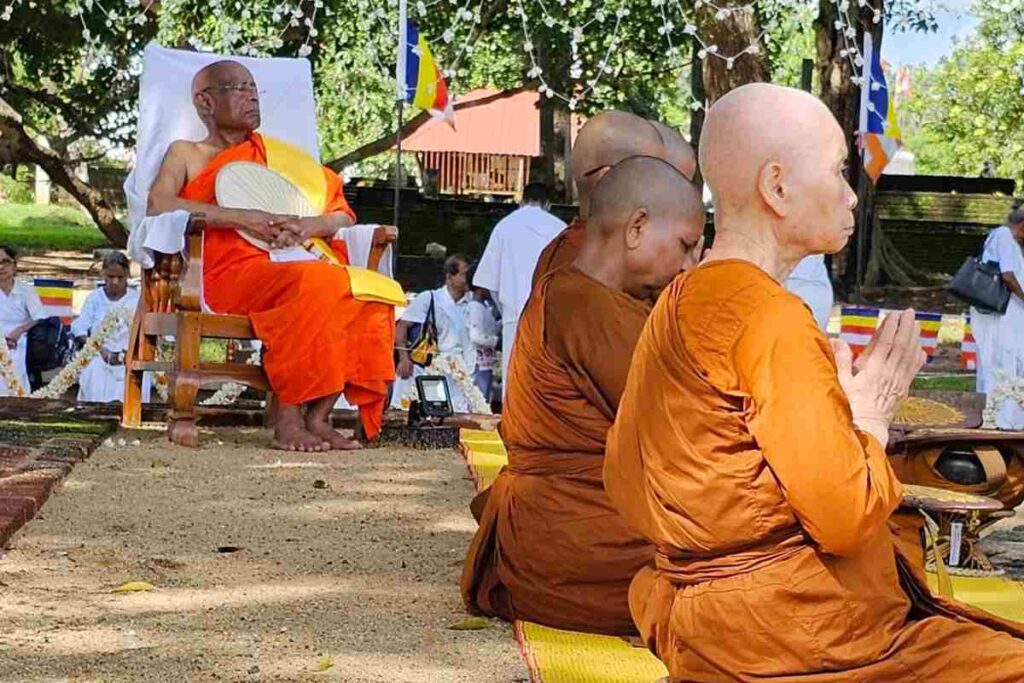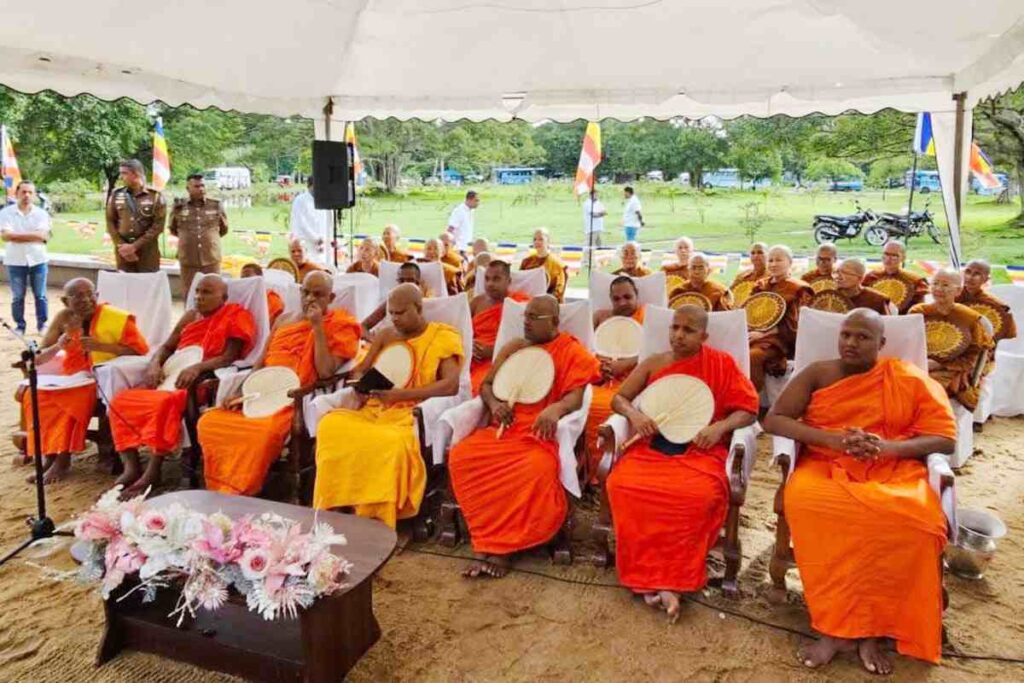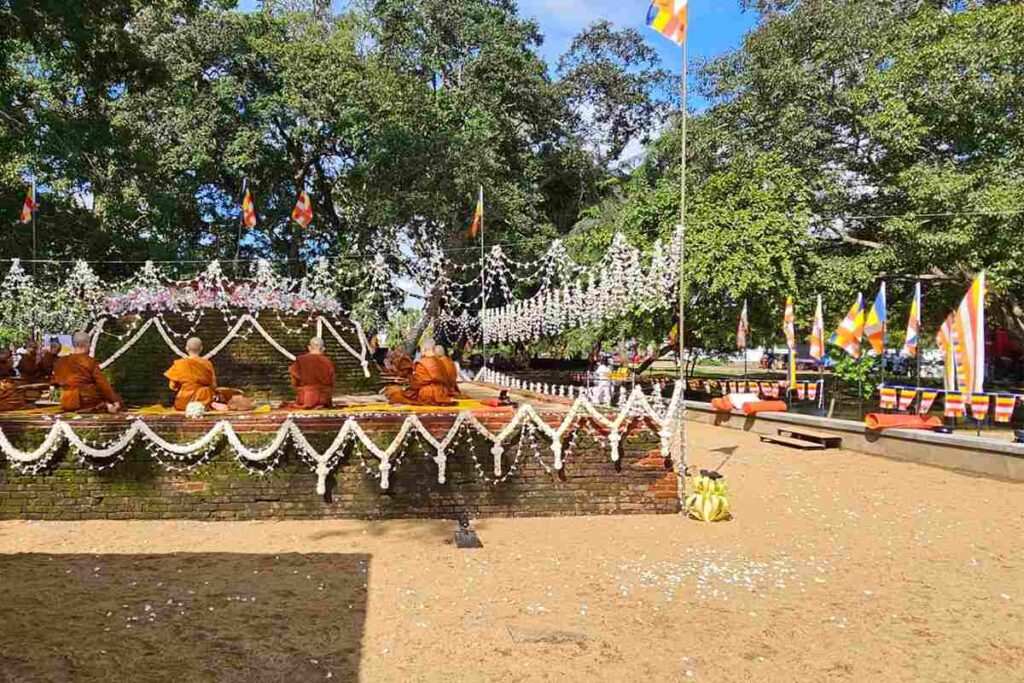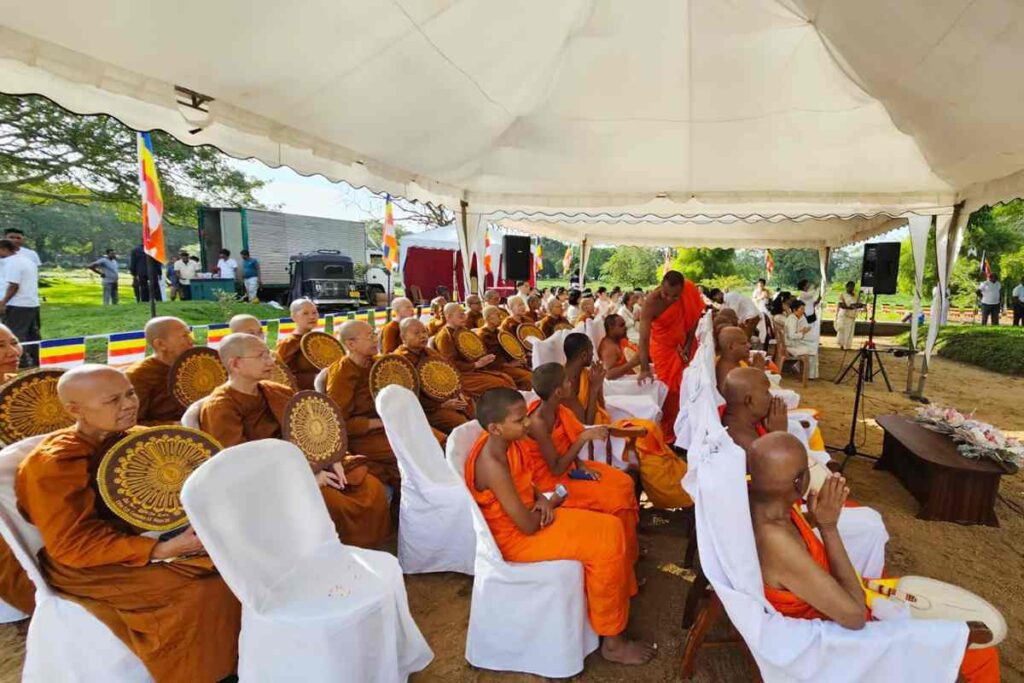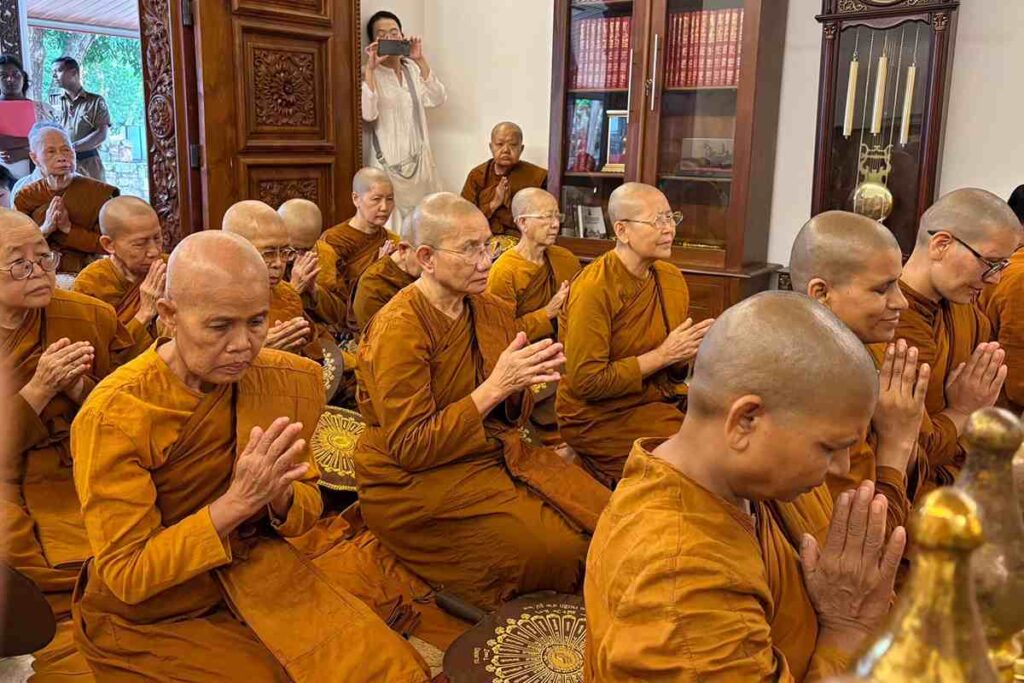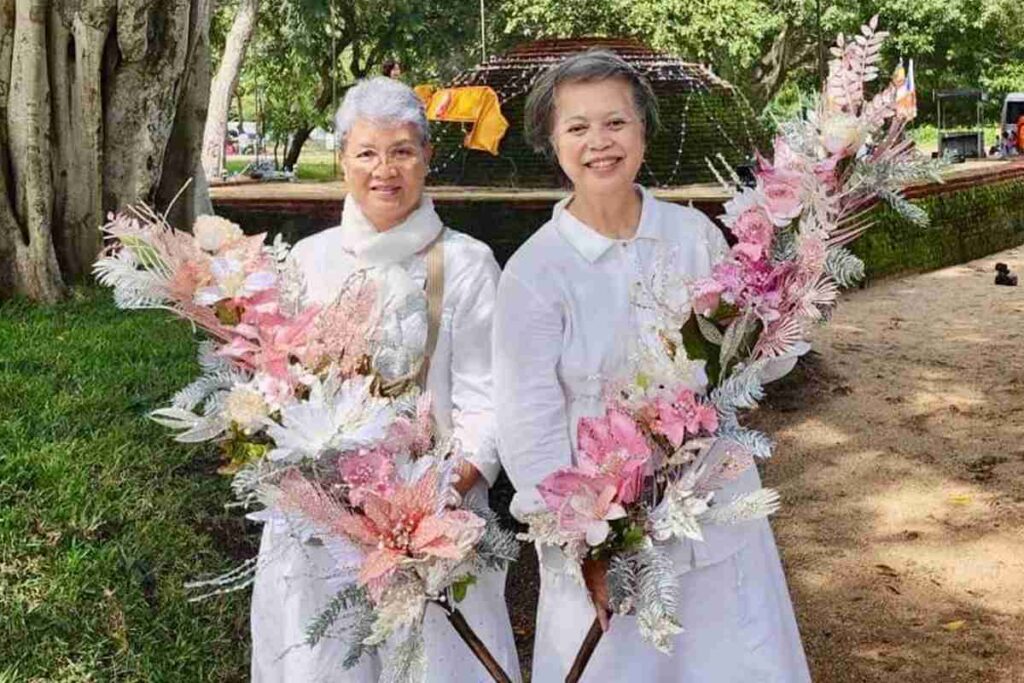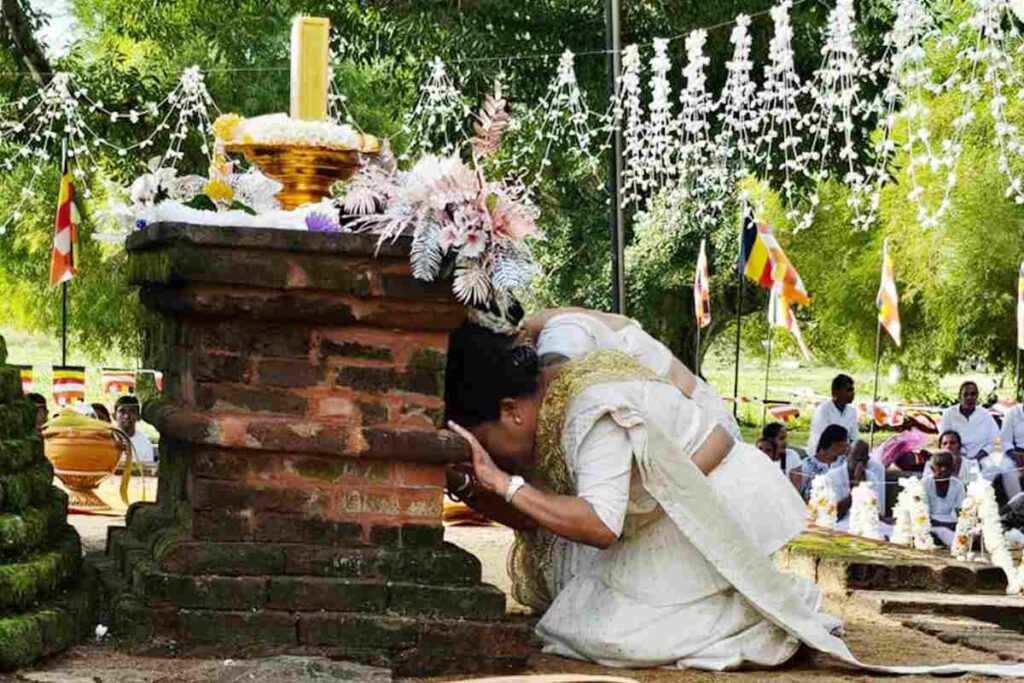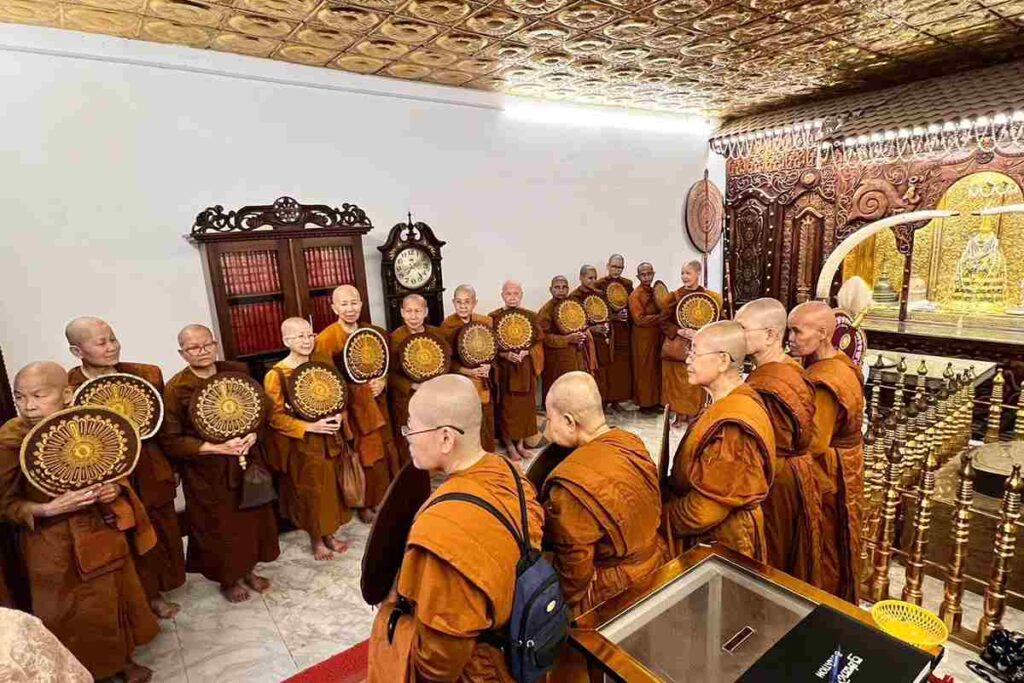The Patimokkha recitation is a formal ritual observed by Bhikkhus, encompassing the recitation of the monastic code of discipline established by the Buddha. Conducted bi-monthly, it serves as a cornerstone of monastic life, outlining the behavioral rules for monks. This recitation must occur in an authorized setting and be audible to the appropriate audience to avoid disciplinary offenses. It emphasizes collective participation over individual recitation, symbolizing the ethical and moral unity of the monastic community.
A historic event took place on December 14, 2024, at the ancient Sanghamitta Stupa in Anuradhapura, Sri Lanka, where a distinguished group of Thai Bhikkhunis recited the Bhikkhuni Patimokkha. This monumental occasion was led by the Most Venerable Aggamaha Panditha Bhante Dr. Walpola Piyananda Maha Thero, the Chief Sangha Nayake Thero of America and President of the USA & Canada Sangha Council, as well as the Chief Abbot and President of Dharma Vijaya Buddhist Vihara, Los Angeles, USA, alongside the Maha Sangha.
In Pali, the verbal presentation of the Patimokkha to the assembly of the Sangha is called the uposatha, which occurs on every full moon and new moon. Before observing the uposatha, four preliminary duties (pubbakaraṇa) must be carried out. When the assembly gathers in the sīmā for the uposatha, five preparatory duties (pubbakicca) must be completed prior to the recitation of the Patimokkha.
During the event, the Thai Bhikkhunis emphasized, “The study and practice of Buddhist teachings in Thailand have been intricately woven into Thai culture over history. However, many principles have deviated from the original teachings in the Tipitaka. To restore Buddhism, it is essential to return to the source by studying the Dhamma and Vinaya directly from the Tipitaka and practicing accordingly. Just as the world relies on both men and women to maintain balance, Buddhism requires the harmonious collaboration of all four Buddhist communities to ensure its integrity and completeness.”
The uposatha concludes with the monks collectively affirming their purity (pārisuddhi). Bhikkhus must have resolved their saṃghādisesa offenses, confessed pāṭidesanīya faults to at least four Bhikkhus, and performed desanā for the remaining minor offenses to achieve moral purity. Only then can the 227 rules of the Patimokkha be recited. After the recitation, the Bhikkhu leading the session inquires whether any rules have been breached. If a monk acknowledges an offense, he must temporarily separate from the community and purify himself. If no transgressions are confessed, silence signifies the Sangha’s purity. The Bhikkhu then declares, “With their silence, we may consider the Sangha pure.” The bi-monthly uposatha gatherings ensure the collective purity of sīla (virtue) within the Sangha, fostering accountability and spiritual discipline. By reaffirming their commitment to the Buddha’s teachings, the monastic community continues to uphold its ethical foundation and unity.
The Buddha Catu Parisa Maha Vihara temples, founded by the Buddha Catu Parisa Foundation, serve as a beacon for the Theravada tradition and the revival of the Bhikkhuni ordination. Headquartered in Thailand, the Foundation has expanded its reach globally, establishing branches in the USA, Australia, Sri Lanka, Uruguay, and India. Their mission is to foster the Theravada tradition while promoting the ordination and training of female monks, or Bhikkhunis, within the framework of the Tipitaka. The roots of the Buddha Catu Parisa Foundation trace back to 1983 with the establishment of the Sikkhadhamma Society in Thailand. Initially created by government officers in the Ministry of Industry, the Society aimed to integrate Buddhist values into the workplace, enhancing both productivity and morale. Monthly Dhamma learning programs featured teachings by monks and Buddhist scholars, gradually increasing the Society’s popularity and support. By 1992, the Society had built a shrine hall on the Ministry’s campus for lectures and Buddhist activities. Membership grew steadily, reaching over 200 members by the early 2000s. In 2005, the Society renamed itself the Sikkhadhamma Tipitaka 84000 Dhammakhandha Society, reflecting its dedication to the Tipitaka’s 84,000 Dhamma teachings. After internal discussions, the Society decided to adopt the Tipitaka as the ultimate authority in its faith and practices, ensuring alignment with the original teachings of the Buddha.
In 2007, the organization further evolved, becoming the Sikkha Buddhavacana Pariyattidhamma 84000 Dhammakhandha Society to emphasize their commitment to studying and practicing the Dhamma. Despite resistance, the Society made the bold decision in 2014 to revive and support the Bhikkhuni community. This marked the establishment of the Buddha Catu Parisa Foundation International, dedicated to creating temples worldwide to uphold the Fourfold Community (Catu Parisa). The Buddha Catu Parisa Maha Vihara temples are unique in their exclusive ordination of female monks, emphasizing the importance of the Fourfold Community: Bhikkhus (monks), Bhikkhunis (female monks), Upasakas (laymen), and Upasikas (laywomen). The temples promote adherence to the Tipitaka, viewing it as the foundation for achieving enlightenment. As a Theravada Buddhist organization, the Foundation aligns with the teachings of the First Buddhist Council, where the Buddha’s Suttas (sayings) and Vinaya (disciplinary rules) were preserved. Their belief is rooted in strict compliance with monastic discipline, as outlined in the Pali Canon, to develop mindfulness and ultimately achieve Nibbana (enlightenment).
The Foundation’s mission centers on fulfilling the Buddha’s vision of the Fourfold Community, as stated in the Mahaparinibbana Sutta. The Buddha declared that his teachings would endure only with the active participation of all four divisions: Bhikkhus, Bhikkhunis, Upasakas, and Upasikas. The Sutta emphasizes that the community must be accomplished, trained, skilled, and well-versed in the Dhamma to refute false teachings and propagate the Buddha’s wisdom effectively. The Buddha Catu Parisa Foundation is dedicated to reviving the Bhikkhuni and Samaneri communities, ensuring the inclusivity of all four divisions. The Tipitaka explicitly supports the capability of women to attain enlightenment, although they are required to follow additional rules compared to men.
Central to the Foundation’s philosophy is the Tiratana (Three Jewels): the Buddha, the Dhamma, and the Sangha. Of these, the Dhamma holds the utmost significance as the guide toward Nirvana. The Foundation believes that the Buddha’s path to Parinibbana has been preserved through the Dhamma, which remains accessible to practitioners today. The Buddha Catu Parisa Foundation seeks to foster a continuous study of the Tipitaka among the Fourfold Community, ensuring that all teachings align with the original words of the Buddha. Their global temples strive to revive and support Bhikkhuni ordination, establishing a strong foundation for Theravada Buddhism’s future. By promoting the Fourfold Community and upholding the Tipitaka, the Buddha Catu Parisa Maha Vihara temples aim to provide a sanctuary for enlightenment and a platform to restore Buddhism to its original purity.
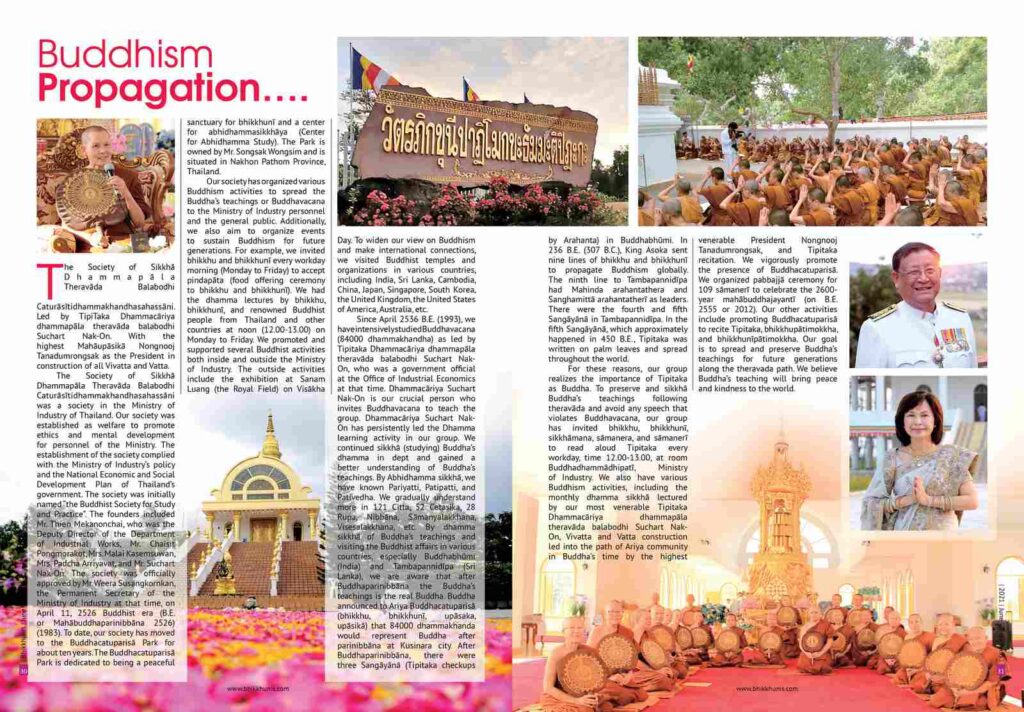
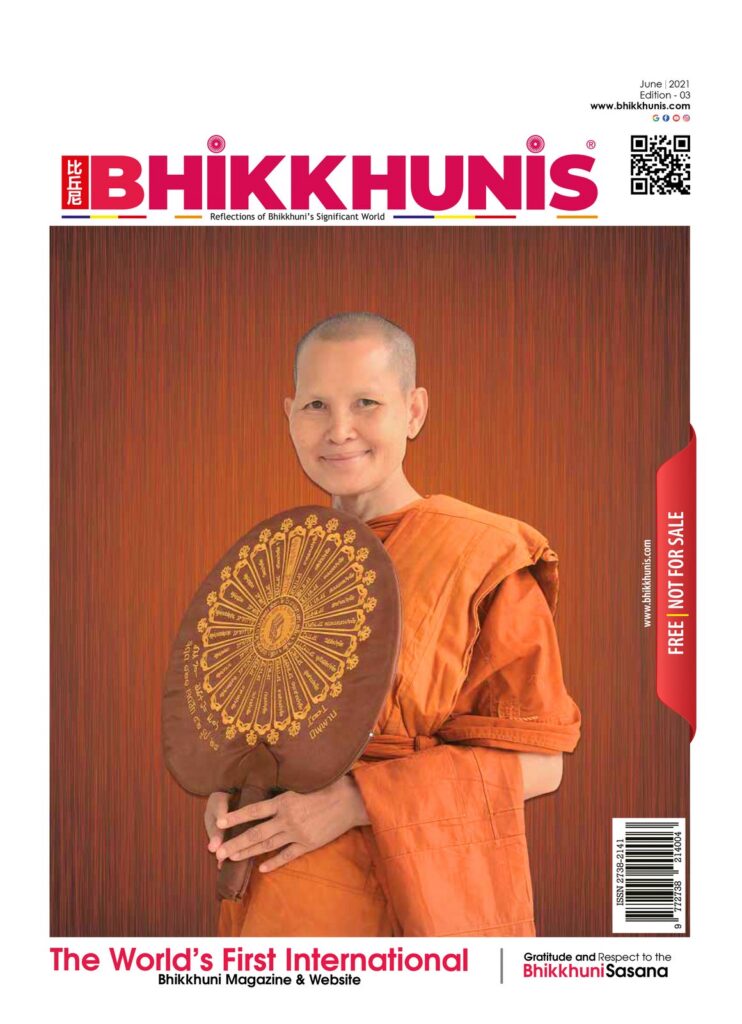
The Society of Sikkhā Dhammapāla Theravāda Balabodhi Caturāsītidhammakhandhasahassāni
The Society of Sikkhā Dhammapāla Theravāda Balabodhi Caturāsītidhammakhandhasahassāni is an esteemed organization dedicated to the study, preservation, and dissemination of the Buddha’s teachings (Buddhavacana). Under the guidance of Tipiṭaka Dhammacāriya Dhammapāla Theravāda Balabodhi Suchart Nak-On, and led by Mahāupāsikā Nongnooj Tanadumrongsak as its president, the society has made significant contributions to sustaining and promoting Buddhism through activities centered around Vivaṭṭa (spiritual liberation) and Vaṭṭa (cyclical existence).
The society was established in 1983 (2526 B.E.) as the “Buddhist Society for Study and Practice” within Thailand’s Ministry of Industry. It was founded to promote ethics and mental development among ministry personnel, aligning with government policies and the National Economic and Social Development Plan of Thailand. The founders included prominent individuals such as Mr. Thien Mekanonchai, Mr. Chaisit Pongmorakot, Mrs. Malai Kasemsuwan, Mrs. Padcha Arriyavat, and Mr. Suchart Nak-On, with official approval granted by Mr. Weera Susangkornkan, then Permanent Secretary of the Ministry of Industry. Over time, the society grew in scope and membership, eventually relocating to the Buddhacatuparisā Park in Nakhon Pathom Province, a serene sanctuary dedicated to bhikkhunī (female monks) and the study of Abhidhamma (higher teachings).
The society organizes a wide range of activities to spread the Buddha’s teachings:
- Daily Pindapāta Ceremonies: Every weekday morning, bhikkhus and bhikkhunīs are invited to accept alms offerings.
- Dhamma Lectures: Noon sessions feature talks by prominent monks, bhikkhunīs, and Buddhist scholars from Thailand and abroad.
- Cultural Exchanges: Visits to Buddhist temples and organizations across countries such as India, Sri Lanka, Cambodia, China, Japan, the UK, and the USA, fostering global connections.
- Annual Exhibitions: Participation in Buddhist celebrations such as Visākha Day at Sanam Luang (the Royal Field).
The society also played a pivotal role in organizing significant ceremonies, such as the ordination of 109 sāmaṇerīs (female novices) to commemorate the 2600th anniversary of the Buddha’s enlightenment in 2012 (2555 B.E.). Since 1993 (2536 B.E.), under the leadership of Tipiṭaka Dhammacāriya Suchart Nak-On, the society has deepened its focus on the study of the Tipiṭaka—the Pali Canon encompassing 84,000 dhammakhandhas. This rigorous study includes topics such as Citta (mind), Cetasika (mental factors), Rūpa (form), Nibbāna (liberation), and other fundamental Buddhist concepts. The society recognizes the Tipiṭaka as the embodiment of the Buddha after his parinibbāna. This view underscores their mission to uphold the teachings through Pariyatti (study), Paṭipatti (practice), and Paṭivedha (realization). Inspired by the Buddha’s declaration in the Mahāparinibbāna Sutta, the society emphasizes the vital role of the Catuparisā (Fourfold Community: bhikkhus, bhikkhunīs, upāsakas, and upāsikās). Their belief is rooted in the Buddha’s vision that a complete and thriving Fourfold Community is essential for the continued flourishing of the Dhamma.
The society’s initiatives include:
- Daily Tipiṭaka Recitations: Organized at the Ministry of Industry to preserve the teachings.
- Bhikkhu and Bhikkhunī Pātimokkha Recitations: Regular chanting of the monastic code to sustain ethical discipline.
- Dhamma Lectures and Training: Monthly sessions led by Dhammacāriya Suchart Nak-On, providing in-depth knowledge of the Theravāda tradition.
The Society of Sikkhā Dhammapāla Theravāda Balabodhi envisions a world guided by the wisdom and compassion of the Buddha’s teachings. By preserving and propagating the Tipiṭaka and promoting the Fourfold Community, the society aims to bring peace and kindness to humanity, ensuring that Buddhism continues to flourish for generations to come. Their unwavering commitment to the Theravāda path demonstrates the transformative power of the Dhamma in fostering spiritual growth, ethical living, and global harmony.
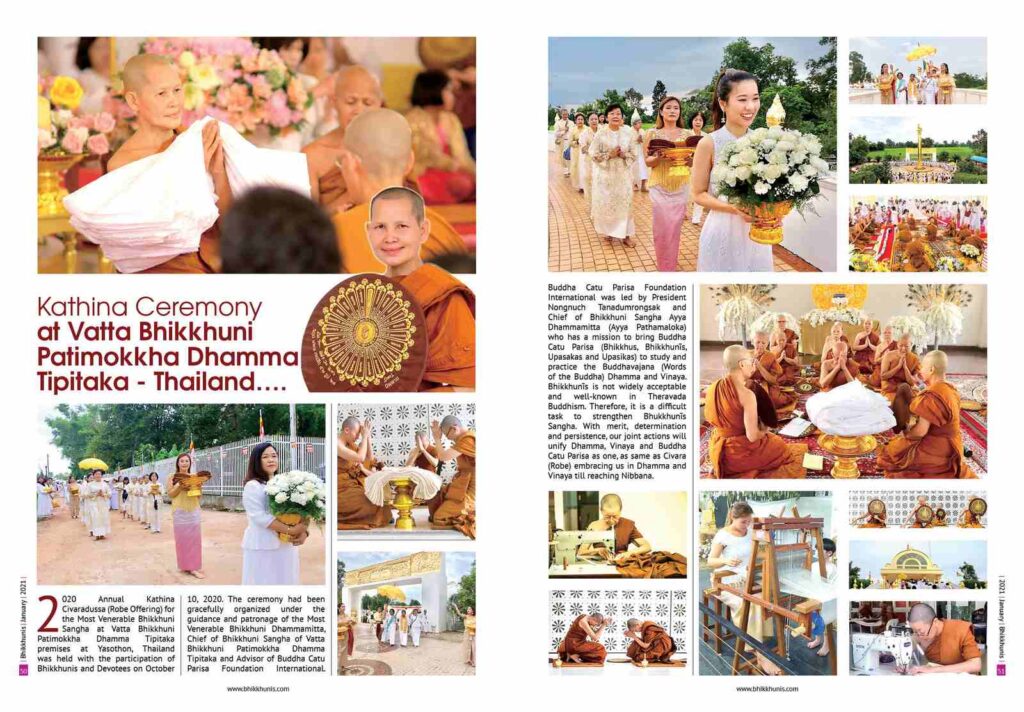
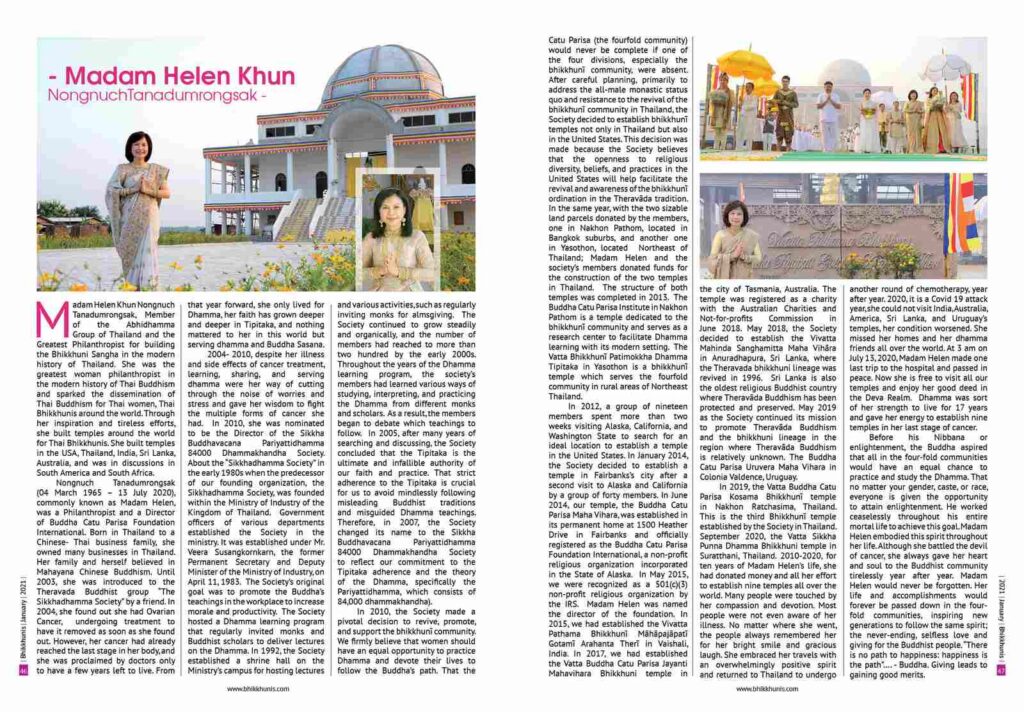
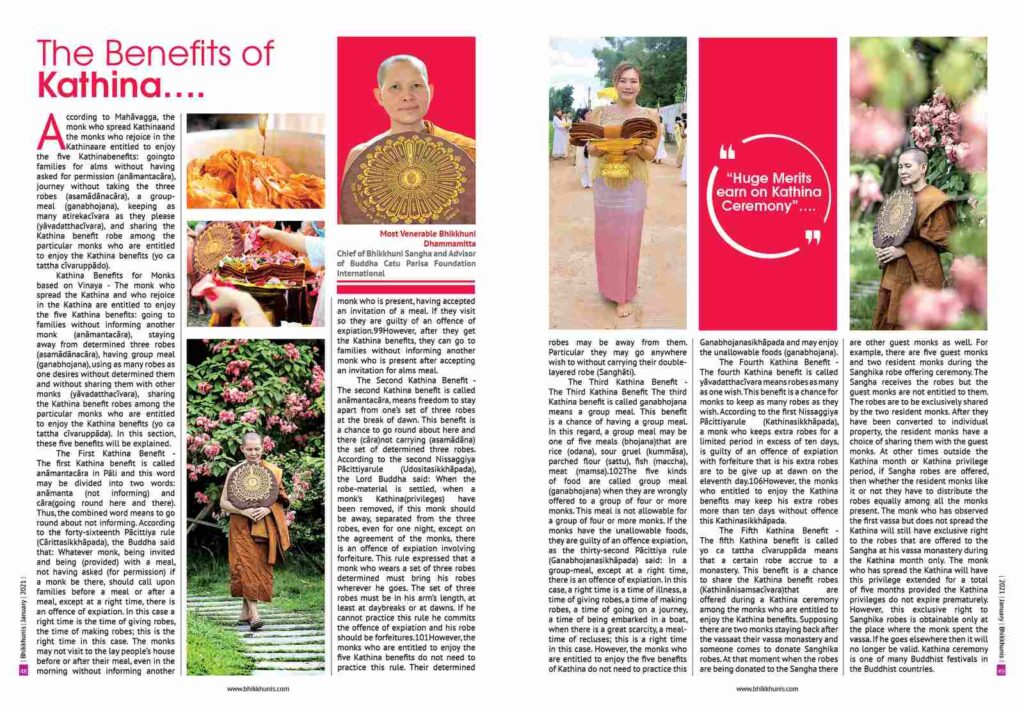
Global Visitors

Nuns
- Targets
- Challengers
- Retreats
- Values
Main Products
- Bhikkhunis Magazine
- Mettavalokanaya Magazine
- Shifu International
- Buddhist Website
Bhikkhunis
- News
- Famous Nuns
- Famous Temples
- Videos

